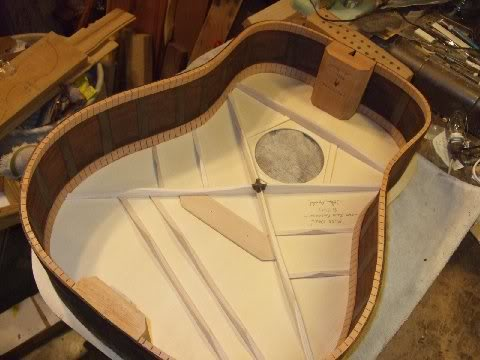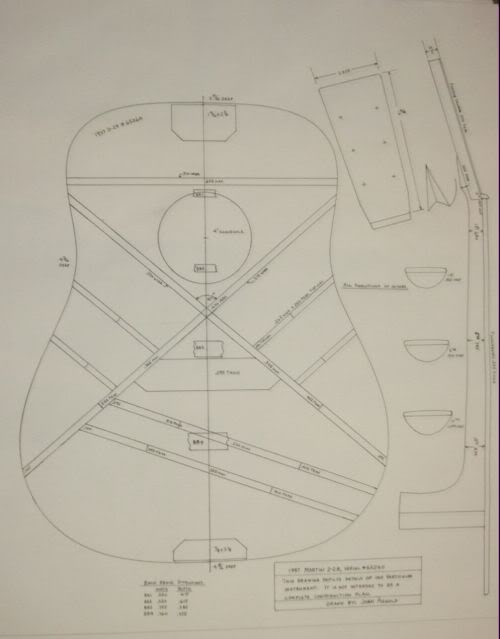My last conversation with Wayne Henderson before Doc Watson passed I ask him if he had any actual measurements that he would share on his bracing and he kind of laughed, not at me...but he actually DOES all of his work by feel and has never actually measured anything...he knows it by heart...folks have checked him many time when he said something measured so and so and he's never been wrong...anyway, to get to the meat of the thing, he told me to give John Arnold a call and talk to him and he was sure John would share his dimensions with me and that they were exactly what Wayne used. In fact, he said that he had worked on John favorite guitar of all time before HE owned it when Wayne was working at Gruhns in Nashville many years ago.
So...for what ever it may be worth, John WAS very kind to share with me and here is what I have:
Borrowed from John Arnold:
One of my favorite guitars of all time is a 1935 D-18 #61033.
All measurements are in inches.
X-brace angle is 97.5 degrees.
Tone bar spacing (C to C) is 1 7/16 @ X-braces, 1 3/8 @ kerfing.
X-braces and tone bars are 0.325 wide.
Bass X minimum = 0.320
Bass X peak = 0.435, 6 5/16 from center of the X crossing
Treble X minimum = 0.300
Treble X peak = 0.565, 5 15/16 from center of the X crossing
Upper tone bar minimum = 0.355
Upper tone bar peak 1 = 0.532, 2 15/16 from the X
Upper tone bar peak 2 = 0.530, 8 3/8 from the X
Lower tone bar minimum = 0.310
Lower tone bar peak 1 = 0.460, 2 3/4 from the X
Lower tone bar peak 2 = 0.500, 8 3/8 from the X
The four short braces (generally called fans) are 1/4 wide, with a peak that is about 1/4 tall. The fans are about 1/16 tall where they intersect the X-braces. The tone bars are about 0.110 tall where they intersect the X-braces.
John
C to C distance from the upper tone bar intersection to the X crossing is 5 1/2. C to C distances from the X to the fans are 2 5/8 and 5 inches.
The angle between the X-brace and the upper tone bar is 62 degrees. Double-check this at the kerfing, where the C to C distance from the X-brace to the upper tone bar should be 1 1/2.
I have found that soundhole locations on 1930's Martins are very consistent. I measure the minimum distance from the brace to the soundhole, which is usually around 0.300". On D-18 61033, that measurement is 0.287.
John.



